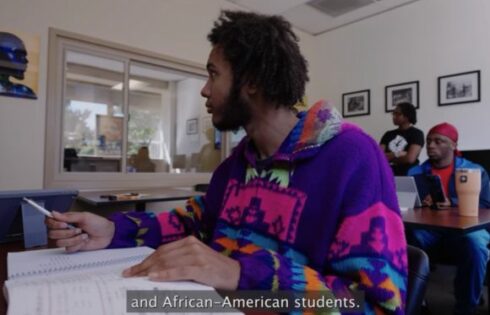
If you want to understand the landscape for law schools these days, watch The Simpsons episode “Homer the Vigilante.”
A dapper cat burglar is plundering the town with impunity, so Homer Simpson organizes a vigilante squad who tries to track him down with a sack of doorknobs:
Kent Brockman: Mr. Simpson, how do you respond to the charges that petty vandalism such as graffiti is down eighty percent, while heavy sack beatings are up a shocking nine hundred percent?
Homer Simpson: Aw, you can come up with statistics to prove anything, Kent. “Forfty” percent of all people know that.
Kent Brockman: I see. Well, what do you say to the accusation that your group has been causing more crimes than it’s been preventing?
Homer Simpson: Oh, Kent, I’d be lying if I said my men weren’t committing crimes.
Kent Brockman: [pause] Well, touché.
Law school deans are giving heavy sack beatings to statistics, and they fully acknowledge it, because they need to catch students.
That’s according to Engines of Anxiety, a recent book by two sociologists on how our collective obsession with rankings is ruining law schools. George Washington University’s Henry Farrell, a professor of political science, interviewed authors Wendy Nelson Espeland and Michael Sauder for The Washington Post.
Law school folks claim they don’t want to game the ranking system set up by U.S. News & World Report, but say they have no choice:
The primary reason most deans pay attention to the rankings is that there are a number of external audiences — prospective students, current students, employers, boards of trustees — who either take the rankings at face value or use them to make decisions. Deans believe that rankings (no matter how questionable their methodology) can have real effects on their school as these external audiences decide where to go to school or whom to hire based on them. Many deans also fear losing their jobs if they don’t produce good numbers. This fear is warranted, given the number of deans and administrators who have lost their jobs as a result of not meeting expectations in the rankings.
Chasing the rankings becomes a “race to the bottom” as more schools join the shady pursuit – misreporting student statistics, “admitting more students to part-time or night programs to protect LSAT and GPA numbers,” maximizing student-faculty ratios by keeping faculty from taking leave when they want:
One pernicious strategy involved changing how schools counted students as “employed.” Before rankings, schools typically counted as employed only those with jobs in law. As the pressure to rise in the rankings increased, some schools realized that neither the [American Bar Association] nor USN specified what “being employed” meant. These schools then began to count any employment — taxi driver, fast-food worker, research assistant — in their statistics, and, not surprisingly, their numbers went up dramatically. Once other schools saw their rankings drop as a result of not adopting this diluted meaning of “employed,” they changed their reporting practices, even if they thought this violated the usefulness of the measure.
Espeland and Sauder have sobering words for those who see statistics as the most objective way to rate a program:
Quantitative data is an important form of knowledge, but we are often not curious enough about the terms of its production and its underlying assumptions. We often take numbers and their authority at face value. …
Rankings have changed how schools make decisions, the type of work administrators and faculty are expected to do, and even how they see themselves. They have also produced a great deal of anxiety as people decide how to manage these consequential numbers and the moral implications of their actions. Numbers do not offer the easy recipe for accountability that their apparent simplicity and apparent objectivity imply.
Like The College Fix on Facebook / Follow us on Twitter
IMAGE: Festa/Shutterstock






Please join the conversation about our stories on Facebook, Twitter, Instagram, Reddit, MeWe, Rumble, Gab, Minds and Gettr.